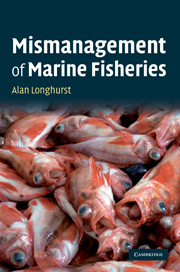Book contents
- Frontmatter
- Contents
- Preface
- 1 From certainty to doubt in fishery science
- 2 The ecological consequences of the exceptional fecundity of teleosts
- 3 Indeterminate growth, negative senescence and longevity
- 4 Marine ecosystems: their structure and simulation
- 5 The natural variability of fish populations and fisheries
- 6 Has sustainability in fishing ever been achieved?
- 7 What is the real state of global fish populations?
- 8 The mechanics of population collapse
- 9 Why don't some fish populations recover after depletion?
- 10 Is the response of the fishery science community appropriate?
- 11 Conclusion: sustainability can be achieved rarely and only under special conditions
- Index
10 - Is the response of the fishery science community appropriate?
Published online by Cambridge University Press: 05 July 2014
- Frontmatter
- Contents
- Preface
- 1 From certainty to doubt in fishery science
- 2 The ecological consequences of the exceptional fecundity of teleosts
- 3 Indeterminate growth, negative senescence and longevity
- 4 Marine ecosystems: their structure and simulation
- 5 The natural variability of fish populations and fisheries
- 6 Has sustainability in fishing ever been achieved?
- 7 What is the real state of global fish populations?
- 8 The mechanics of population collapse
- 9 Why don't some fish populations recover after depletion?
- 10 Is the response of the fishery science community appropriate?
- 11 Conclusion: sustainability can be achieved rarely and only under special conditions
- Index
Summary
‘I have spent most of my life opposing the hubris of managing the ocean and its contents: a losing battle, I'm afraid . . .’
Sidney J. HoltAround the turn of the century, the delicate state of fisheries resources and the uncertain future of the industry had captured the attention of scientists, economists and the general public in a way that it had never done previously, perhaps because it was part of the wider public concern for the natural environment that was then developing. Two different but related threads emerged in the discussions: (i) evaluations of the probability that adequate supplies of sea food could be sustained if wild populations remained heavily depleted, and (ii) proposals for novel approaches to stock management that might perhaps avoid what seemed to many to be an inevitable global collapse of fishery resources.
This is not the place to try to add substantively to the speculation concerning the trajectory that the supply of seafood is likely to follow in the future and what balance will be achieved between landings of wild-caught fish and the production of fish in sea-ranching facilities. A very comprehensive look into that particular crystal ball, published as recently as 2005, suggested that the future of fisheries is already with us: the authors predicted that collapses of global financial markets and oil price shocks would each modify rather strongly the future trajectory of fisheries. As I write, the world is already struggling with collapsing financial markets, and we are also wondering what happened to the brief oil price shock that caused French fishermen to blockade their ports only last summer to demand fuel subsidies! Now, their problem is quite different because of declining consumer demand; wholesalers are currently dumping unsold inventory, and ex-boat prices are collapsing – so the fact that fuel prices have also collapsed is probably cold comfort.
- Type
- Chapter
- Information
- Mismanagement of Marine Fisheries , pp. 261 - 290Publisher: Cambridge University PressPrint publication year: 2010



